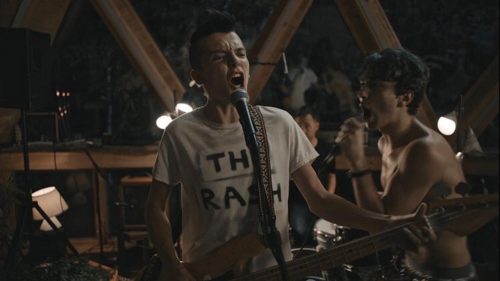The House of Tomorrow: Rise Above, by David Bax
It’s pretty difficult to boil the life and work of Buckminster Fuller down to one idea and, to its credit, Peter Livolsi’s The House of Tomorrow, whose protagonist is a boy raised almost entirely on Fuller’s teachings, doesn’t try to do so. But, since it does mention synergetics a couple of times, I’ll briefly focus on that. The word, invented by Fuller, addresses, among many other things, self-organizing structures. That’s a pretty good way to describe what unfolds in The House of Tomorrow, in which families, separated from society or rent apart by death, divorce and disease—reform in new ways.
Asa Butterfield stars as Sebastian, who lives with his grandmother, Josephine (Ellen Burstyn), a student and acolyte of Fuller, in a geodesic dome in North Branch, Minnesota. Sebastian is homeschooled when he’s not working as a tour guide and receptionist of their home, which doubles as a museum and Fuller tribute and provides them with income for the necessities, like sprouted grain bread and cashew cheese. When a Lutheran youth group takes the tour, Sebastian stumbles into a prickly, awkward friendship with the pastor’s son, Jared (Alex Wolff), who at first mocks Sebastian’s oddball naiveté but soon convinces him to start a band.
In addition to those already named, The House of Tomorrow’s solid cast is rounded out with Nick Offerman as the pastor, conveying both dorky authority and a pitiable vulnerability; Maude Apatow as Jared’s popular older sister, who feels and cares more than she lets on; and Michaela Watkins in a small but moving role as a bad mother who at least possesses the awareness of her failures, if not the motivation to do anything about them other than stay out of the way. And Fred Armisen’s voice gets thrown in for good measure.
Butterfield is the star, though, and the movie’s only major weakness is his inability to live up to the cast around him. Butterfield is an adult actor still playing his characters as children. In both this case and in last year’s risible The Space Between Us, there are reasons for the arrested development but, in his competent but uninspired hands, Sebastian remains little more than the figure around which everyone else spins, evoking little to nothing in the way of a catharsis of his own.
Wolff is far more effective as the kind of stir-crazy weirdo suburban kid full of aimless rage that I, frankly, identify with all the way down to my punk rock bones. Oh, did I forget to mention The House of Tomorrow is a movie about punk? Early on, Sebastian, raised on nothing but classical music and whale sound recordings, is forced by Jared to listen to The Germs. We don’t even need Sebastian’s widening eyes and stunned smile to understand how life-altering this moment is for him; The Germs are fucking awesome. From there, it’s on to Black Flag, The Replacements and everything else a kid who’s angry at the world but doesn’t know why needs to make sense of things. Writing as someone who believes that punk rock literally saved his life, it’s refreshing to be able to say that a movie gets it right.
The House of Tomorrow isn’t just a testament to the power of mohawks and mosh pits, though. Instead, it’s a uniquely un-saccharine look at family. These are the people, the movie seems to say, that it’s okay to hurt and be hurt by. The pain and the forgiveness will make everyone stronger together.




























